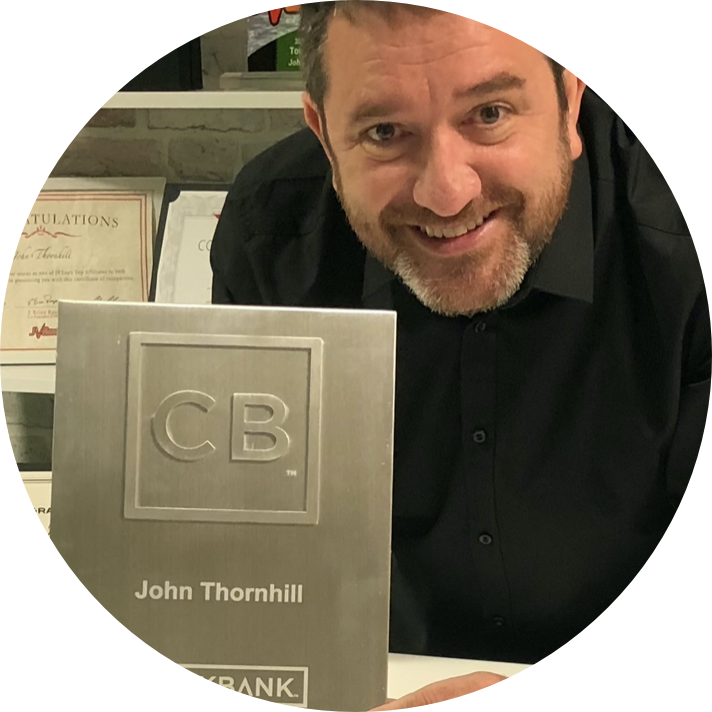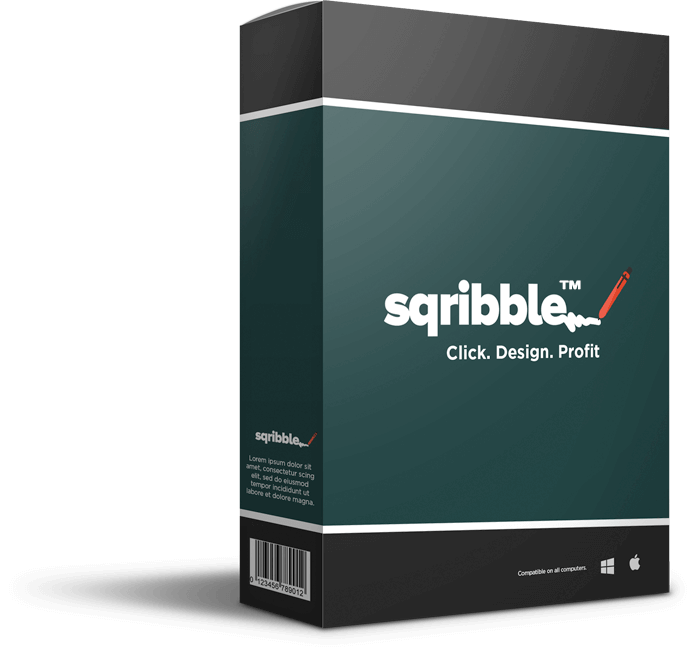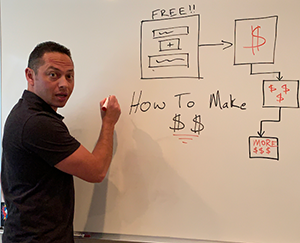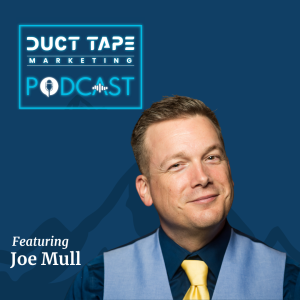How to Scale Your Business Upward Without Adding Overhead: Proven Strategy written by John Jantsch read more at Duct Tape Marketing Scaling is the business owner’s dream, but it doesn’t always work out the way they imagined…The reality is, growth and scale aren’t the same thing. A lot of times, you might be growing your business, seeing more revenue, and attracting more customers. Yet, instead of scaling upward, you’re scaling sideways. You’re running faster, spinning more […] How To Retain Top Talent While Prioritizing Their Quality Of Life written by John Jantsch read more at Duct Tape Marketing Marketing Podcast with Joe Mull In this episode of the Duct Tape Marketing Podcast, I interview Joe Mull. He is the founder of the BossBetter Leadership Academy and hosts the popular BossBetter Now Podcast, which was recently named by SHRM as a “can’t miss show for leaders” along with podcasts from Brené Brown and Harvard Business Review. He is the author of 3 books including his newly released Employalty: How to Ignite Commitment and Keep Top Talent in the New Age of Work, a framework for creating an employee experience that leads people to join a company, stay long term, and do a great job. This book will teach you how to attract and retain talent and turn ordinary people into devoted employees. Key Takeaway: Employalty emphasizes the idea of attracting and retaining top talent by creating a more humane employee experience that focuses on their quality of life. The goal is to create an environment that recognizes employees’ individual needs and allows for a better work-life balance. Companies should become a destination workplace and for this, they should win in three areas of the employee experience: an ideal job, meaningful work, and becoming a great boss. Questions I ask Joe Mull: [01:55] What were you hoping to add to the topics of hiring and quitting with this book? [04:00] Employalty sounds about employee loyalty, but that’s not what it is. What is Employalty? [04:55] Gen Z wants different things in work, can you explain the “myth of lazy”? [07:31] How do leaders and business owners turn their company into what you call a Destination Workplace? [11:52] You say that every employee in every company has an internal scorecard that determines whether they stay long-term and commit to their work. Please explain that idea. [12:58] Can you elaborate on the phrase: “the era of hiring the best person for the job is over”. [18:08] Where do diversity, equity, and inclusion, you know, initiatives fit into the idea of Employalty? [20:09] Where’s AI going to fit in the destination workplace? More About Joe Mull: Get your copy of Employalty: How to Ignite Commitment and Keep Top Talent in the New Age of Work Joe’s website More About The Agency Certification Intensive Training: Learn more about the Agency Certification Intensive Training here Take The Marketing Assessment: Marketingassessment.co Like this show? Click on over and give us a review on iTunes, please! Duct Tape Transcript Email Download New Tab John Jantsch (00:00): Hey, did you know that HubSpot’s annual inbound conference is coming up? That’s right. It’ll be in Boston from September 5th through the eighth. Every year inbound brings together leaders across business, sales, marketing, customer success, operations, and more. You’ll be able to discover all the latest must know trends and tactics that you can actually put into place to scale your business in a sustainable way. You can learn from industry experts and be inspired by incredible spotlight talent. This year. The likes of Reese Witherspoon, Derek Jeter, Guy Raz are all going to make appearances. Visit inbound.com and get your ticket today. You won’t be sorry. This programming is guaranteed to inspire and recharge. That’s right. Go to inbound.com to get your ticket today. (01:03): Hello and welcome to another episode of the Duct Tape Marketing Podcast. This is John Jantsch. My guest today is Joe Mull. He’s the founder, the boss, better Leadership Academy, and the host of the Boss Bette Now podcast, which was recently named by SHRM as a “can’t miss show for leaders” along with podcasts from Brene Brown and Harvard Business Review. He’s the author of three books, including one we’re gonna talk about today. And I’m gonna stumble over this word every time cuz it’s a made up word. It’s awesome, Employalty. It’s a mouthful. How to Ignite Commitment and Keep Top Talent in the New Age of Work. So Joe, welcome to the show. Joe Mull (01:44): Thank you John, and you nailed the title my friend. I’ve gotten a lot of different iterations of that. And you were pitch perfect. It’s Imploy. . John Jantsch (01:52): Awesome. So obviously the topic of hiring and quitting and , you know, whatever you wanna call it, is high on people’s minds right now. So what were you hoping to maybe kind of tap into current wise with this book? Joe Mull (02:10): Well, this book was really born after I continued to get frustrated with some of the dialogue that was taking place around why it was so, so hard to find people in the aftermath of the pandemic, why it was so hard to get people to stay with an organization and why so many people were actively changing jobs. (02:27): There’s this narrative that’s been taking place that, you know, nobody wants to work anymore or that this is really a generational issue and we have a ton of data that tells us that it’s not true. Yeah. What we’ve been calling the Great Resignation, it actually has been going on for about 13 years. When you look at the number of people who have been voluntarily changing jobs to take better jobs. Yeah. We know a lot of that is being driven by quality of life and that’s really at the heart of what this book’s about. John Jantsch (02:53): Yeah. , it’s become sort of a joke, you know, it seems like every episode I do lately, I go, well, don’t wanna blame this on the Pandemic, but , it’s like, but it’s so easy. I mean, I think a lot of what happened in the Pandemic is it just accelerated everything, didn’t it? Like you talked about, this has been going on for a long time and now a whole swath of people woke up and said, you know, life sucks. My job can’t suck too. Right, Joe Mull (03:17): That’s exactly right. There was a sort of values reshuffling that took place. Yeah. And then if you think about it, the covid didn’t cause the covid, I just called it the Covid Covid. John Jantsch (03:27): It’s like the Google was That’s the Google, isn’t it? Joe Mull (03:29): Yeah, the Google. Yeah. You know what Covid did do to the workforce is it made everybody braver. (03:34): Right? Prior to the pandemic a, a major job change was a major life decision. You’d weigh the pros and cons and talk to people in your network, and then the pandemic arrived and it injected so much instability and uncertainty into the job market for so many people who then lived with that for two years. And so our risk aversion to job changes got obliterated by this massive global happening. So now it’s not such a big deal to think about a change. John Jantsch (04:00): Yeah. So the title, which apparently I nailed loyalty, you know, has the word loyal, sort of right smack in the middle of it. And just because you have told me differently, well that’s not really what this book’s about, is it? I mean, because it, you read that in the first glance, you might think employee loyalty, I get it. Mash those together. Right? (04:21): But you’re not talking about that at all, are you? Joe Mull (04:23): No. We’re playing a little bit of a trick on the reader here. Right? You hear, you see the word and you think employee loyalty, but employalty is actually a port man toe of the words employer loyalty and humanity. Yeah. So employalty is the commitment that employers make to a more humane employee experience because we know nowadays that’s what triggers commitment at work. John Jantsch (04:44): So, and we can’t really even pick on millennials anymore, right? I mean, they’re like old now Joe Mull (04:49): So they’re 40 now, John. That’s right. Yeah, exactly. John Jantsch (04:53): The oldest ones anyway of, you know, they want different things. The next generation, which I guess we’re calling Gen Z now, you know, wants different things in work. And a lot of, you know, gray haired employers are, you know, interpreting that is, nobody likes to work, you know? (05:07): Mm-hmm. the myth of lazy, I think you even called it. And it’s really not that at all, is it? Joe Mull (05:13): It’s not. So we know that over the past two decades, the workforce on the whole, across every generation, has continued to endure a handful of burdens. The amount of work workloads have exploded in the past 20 years. Wages have been largely stagnant for nearly 40 years, up until about two years ago was the first time we started to see that number move. (05:34): At the same time, burnout has become an all time high records in the workplace, even before the pandemic arrived. And so what we’re seeing is people saying, I need a change. And those changes are being driven by quality of life. There’s a, a massive recalibration taking place around how work fits into our lives. And there’s more opportunity than ever before, John, because we keep adding so many jobs to the economy. (05:56): And so right now there needs to be a mindset shift for folks who employ people. There is no staffing shortage, there’s a great jobs shortage. There’s more opportunity than ever before for people to go out and upgrade their work situation. And unless you decide to be the upgrade, you’re gonna struggle to find and keep people John Jantsch (06:16): You know, in the housing market, you talk about a seller’s market, a buyer’s market, and of course, you know, a lot of people are suggesting that, you know, the upper hand right now is with employees. And so a lot of employers are reacting to that. But is that, you know, are, is that just an ebb and flow thing? I mean, will that turn itself around? Joe Mull (06:34): There’s always gonna be a little bit of ebb and flow in terms of the demand for workers in the job market. But when you look at the numbers, we’ve added jobs to the economy at a a, a breakneck pace for almost 10 years straight, right? (06:46): We still have right now nearly 10 mil million unfilled jobs. If you took every unemployed person in the country right now and gave them a job, you’d still have 5 million unfilled jobs tomorrow. And we expect worker shortages in a whole host of categories going forward for the next 10 years. (07:02): So yes, you’re gonna see ebbs and flow in terms of the economics and recessions and pay and demand, but the numbers game is not gonna change. We simply do not have enough people to do all the jobs that we’ve added to our eco our economy. So if you can be the upgrade, right? If you can be a destination workplace, you create an extraordinary competitive advantage for yourself, both in terms of attracting and retaining talent and the quality of the products and services your business delivers. John Jantsch (07:30): So you mentioned a great phrase there, destination workplace. I’d love for you to kind of unpack like how does somebody turn their company into one of those? I mean, I think there’s some obvious things, but there are probably some companies out there. The culture hasn’t been that great, you know, and they’re starting to realize sort of the price of that. You know, how do you turn that around? Joe Mull (07:48): Well, we analyzed more than 200 research studies and articles on why people quit a job or take a new job or decide to stay with an employer. And we can say with conviction that you become a destination workplace if you win in three areas of the employee experience. In the book we call them ideal job, meaningful work, and great boss. (08:09): Now, some of this sounds self-explanatory, right? Great boss is pretty clear. But there are a handful of things that we know bosses have to get right in order for someone to call them a great boss, like earning trust and coaching and being an advocate. (08:22): But those other two factors of ideal job and meaningful work might be a little less clear. Ideal job is about what I get in exchange for what I do. That’s about my compensation, my workload and flexibility. When those three things are right, that job fits into my life like a puzzle piece snapping into place and it becomes my ideal job. Meaningful work really comes down to purpose, strengths and belonging. (08:46): Do I believe my work matters? Does it align with my unique talents and gifts? And am I doing it on a team where I feel celebrated and accepted for who I am and what I contribute? When you give someone their ideal job doing meaningful work for a great boss, they look around and they say, Hey, I like what I’m doing here, who I’m doing it with, let’s go. And then their commitment level goes up. John Jantsch (09:07): It’s funny, I think the flexibility probably jumped on the list several notches because so many people had never experienced work from home and the flexibility that gave them, and all of a sudden it’s like, I like this, you know? Yes. I check my five minute break and go get some laundry done instead of just like, you know, sitting around chatting with people. And I think that flexibility piece probably went way up the list, didn’t it? Joe Mull (09:29): It did it. Now the number one most requested workplace benefit in the world. But here’s the interesting piece of this, John, is that flexibility, remote work is just one kind of flexibility. Flexibility is really about giving people some autonomy and some influence to decide when, where, or how they work. (09:47): So if you’re an employer who isn’t able to offer a remote work option, like for example, flight attendant, not an ideal work from home job, but maybe you’re giving people the opportunity to choose the length of their shift or the start time or their days of the week, or who they work with, or the locations where they work. (10:05): We know that giving some of that influence back to people directly correlates with commitment. John Jantsch (10:12): I could actually see somebody flying a plane from just like a little console, you know, on their desk at home. What do you think? Joe Mull (10:18): Isn’t it already a lot of autopilot? I’m not a pilot and I’m taking nothing away from the people who fly me around the country when I go to speak, but I know the computers are heavily involved. John Jantsch (10:28): Now let’s hear a word from our sponsor. Marketing Made Simple. It’s a podcast hosted by Dr. JJ Peterson and is brought to you by the HubSpot Podcast Network. The audio destination for business professionals marketing made simple brings you practical tips to make your marketing easy and more importantly, make it work. And in a recent episode, JJ and April chat with StoryBrand certified guides and agency owners about how to use ChatGPT for marketing purposes. We all know how important that is today. Listen to marketing made simple. Wherever you get your (11:05): Hey marketing agency owners, you know, I can teach you the keys to doubling your business in just 90 days or your money back sound interesting. All you have to do is license our three-step process that’s gonna allow you to make your competitors irrelevant, charge a premium for your services and scale perhaps without adding overhead. And here’s the best part. You can license this entire system for your agency by simply participating in an upcoming agency certification intensive look, why create the wheel? Use a set of tools that took us over 20 years to create. And you can have ’em today, check it out at DTM world slash certification. That’s DTM world slash certification. (11:51): So I kinda laughingly tell a lot of companies I work with from a marketing standpoint that you know, you have a brand, you know, they’re like, oh, branding that’s for a big company. (11:59): It’s like, no, you have a brand. It’s just whether or not it’s intentional. And you talk about the idea that every company has an internal scorecard, which is sort of their employer brand on the inside. So talk a little bit about that and how maybe somebody taps into that idea. Joe Mull (12:13): Yeah. So every employee is measuring you against this internal psychological scorecard that they have that’s made up of those factors of ideal job and meaningful work and great boss. And so if I’m coming to your company every single day and my compensation is below what I need it to be, if I’m struggling with an overwhelming workload, if I get no flexibility whatsoever. (12:34): Then I’m not able to check those ideal job boxes. The same is true with meaningful work. If I experience exclusion, for example, if there’s no opportunity for me to grow my career, if I’m not getting any support or coaching from my boss, these are the boxes on that
Related Posts
Recommended Story For You :

e-business-e-marketing
How To Make $3493 Commissions Without Doing Any Selling

e-business-e-marketing
Successful dropshippers have reliable suppliers.

e-business-e-marketing
People Think I Use A Professional Voiceover Artist. NO! I Just Use Speechelo!

e-business-e-marketing
Make Money Testing Apps On Your Phone Or Tablet

e-business-e-marketing
Make More Money or Lose Everything

e-business-e-marketing
Sqribble Is The ONLY eBook Creator You’ll Ever Need.

e-business-e-marketing
Work & Earn as an Online Assistant

e-business-e-marketing
Create Ongoing Income Streams Of $500 To $1000 Or More Per Day

e-business-e-marketing
